- What Exactly Are Custom Applications?
- Custom vs. Commercial Software For Business
- What Are The Benefits Of Custom Application Development?
- Custom Applications Development Process
- Best Practices For Custom Application Development
- Pros And Cons Of The Custom App Development
- Trending Technologies For Developing Custom Applications
- Why Custom App Development Is The Next Step For Your Business?
- Build Your Custom Application With Idea Usher
- FAQ
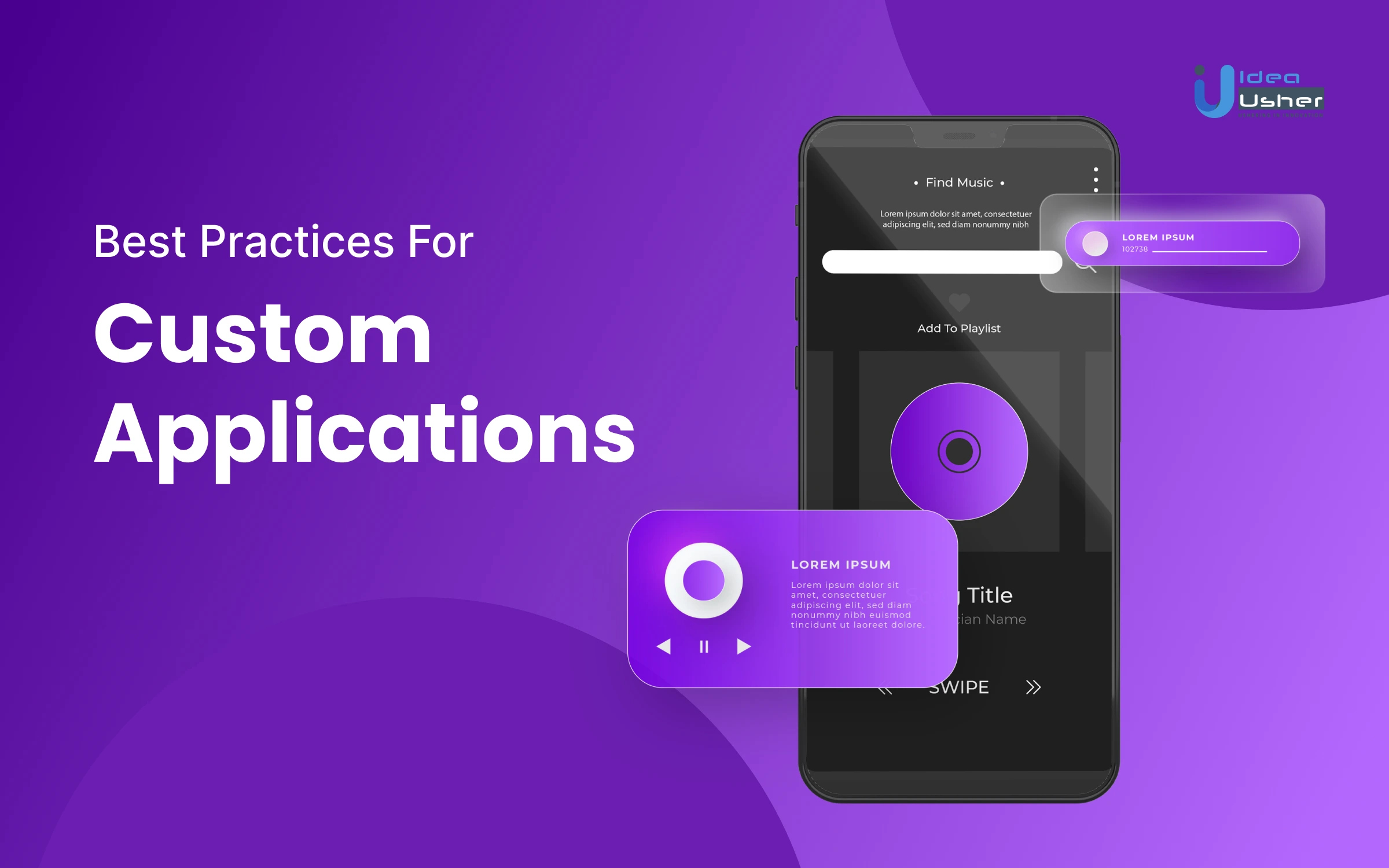
Custom app development refers to creating software applications tailored to meet the unique needs of a particular business, where a pre-built product in the market may not fit the bill. Historically, the process of custom application development has been hampered by high cost and time investments. However, with the advent of low- and high-code platforms, developers can now streamline the development process by abstracting away many of its complexities. This has made custom application development more accessible, efficient, and cost-effective, enabling businesses to quickly deploy software applications that precisely align with their organizational objectives. This blog will cover the benefits, best practices, and everything you need to know about successful custom application development.
- What Exactly Are Custom Applications?
- Custom vs. Commercial Software For Business
- What Are The Benefits Of Custom Application Development?
- Custom Applications Development Process
- Best Practices For Custom Application Development
- Pros And Cons Of The Custom App Development
- Trending Technologies For Developing Custom Applications
- Why Custom App Development Is The Next Step For Your Business?
- Build Your Custom Application With Idea Usher
- FAQ
What Exactly Are Custom Applications?
Custom application development pertains to the creation and implementation of software solutions that address distinctive functions, users, or brands. It encompasses the design, development, deployment, and maintenance of software applications that are tailored to the specific needs of a particular business or organization.
Hiring a software development firm to conduct a comprehensive analysis of the business goals and product requirements enables a thorough understanding of the preferences and needs of both the customers and the organization. This analysis serves as the foundation for developing customized software solutions characterized by their dynamism, scalability, and cost-effectiveness, allowing for seamless workflow processes and providing businesses with a competitive advantage.
Custom vs. Commercial Software For Business
Before we proceed further, it is important to acknowledge the difference between custom and commercial off-the-shelf software. However, it is notable that the specific differences between these solutions may vary depending on the business needs and individual software solutions.
| Criteria | Custom Solution | Commercial Solution |
| Cost | Generally, higher upfront costs due to development and implementation costs | Lower upfront cost but ongoing subscription or licensing fees |
| Flexibility | Highly customizable to meet specific business needs | Limited customization options, often designed for general use cases |
| Time to Implement | Longer implementation time due to the development process | Shorter implementation time, as the software is already built |
| Maintenance & Support | It may require additional resources for ongoing maintenance and support | Typically includes vendor-provided maintenance and support |
| Scalability | Can be designed and built to scale with the business | Limited scalability may require switching to a new software solution as the business grows |
| Integration | Can be designed to integrate with existing systems and processes | May require additional software or development to integrate with existing systems |
| Functionality | Can be built to include specific features and functionality | Has pre-built features and functionality, which may not meet all business needs |
| Ownership | Complete ownership and control over the software solution | Limited ownership and control, dependent on vendor and licensing agreement |
One of the most impressive aspects of custom application development is its capacity to bring to life the exact idea envisioned by a business or individual, and it strives to meet the unique requirements of an organization. On the other hand, commercial off-the-shelf solutions provide a one-size-fits-all approach that caters to a broad audience of companies. This results in a uniform design and performance of the same applications, regardless of each business’s individual objectives. Typically, such applications are offered as Software as a Service (SaaS), which means that companies have to pay for the rental of the software.
What Are The Benefits Of Custom Application Development?
1. Improved Efficiency:
- Custom applications are specifically designed to meet the unique operational and workflow needs of an organization and its users.
- The primary objective of custom application development is to increase the operational efficiency and productivity of the company and its workforce.
- By streamlining workflows, eliminating unnecessary steps, and automating tedious manual tasks, custom software can significantly improve efficiency and add value to the business.
2. Agility:
- Agility is a key factor in managing the growth of any business, and custom software development allows for quick and easy updates to meet evolving requirements.
- Custom software solutions can outperform off-the-shelf alternatives due to their adaptability, facilitating automated tasks and improving teamwork in enterprise-specific software applications.
3. Enhanced Scalability:
- Custom software can be easily adapted and expanded to accommodate a company’s evolving needs and requirements.
- Developers can incorporate new features and functionalities into the software as needed, saving businesses the cost of purchasing additional licenses and subscriptions for commercial software.
4. Independent Solutions:
- Custom applications give businesses the freedom and autonomy to develop and maintain their software without relying on third-party commercial software development companies.
- This means that businesses are not subject to the frequent price hikes associated with support and licensing for commercial software. They can also continue using the software even if a product goes out of business or a vendor discontinues it.
5. Reduced Costs:
Custom application development solutions are designed to integrate seamlessly with an organization’s existing infrastructure, reducing the cost of integration and ensuring compatibility with the existing environment.
6. Security:
- Software security is also a significant concern for businesses using commercial software. Hackers can access the database of commercial software, causing data breaches and information leaks.
- However, custom software development can offer robust security measures to protect against these attacks.
- This type of application allows the implementation of spam filters, intrusion detection, secure network passwords and validation, inbound traffic filtering firewalls, accessible login data, and much more that contribute to securing the source codes and crucial data.
7. White-label Products:
- Creating white-label products is another benefit of custom software development.
- Developing a unique internal solution can result in licensing opportunities to other businesses or providing a white-label product for a flat fee.
- However, this approach may not be sustainable during the early adoption, particularly in competitive industries.
8. Competitive Advantage:
- Custom software development can also give a business a competitive advantage.
- Implementing custom solutions can help teams maximize productivity and efficiency, providing added value to customers.
- Additionally, it can offer capabilities that competitors do not possess, making businesses stand out in their industry.
9. Personalization:
Custom software development provides businesses with higher personalization and tailored solutions to their unique needs. It offers value for money and prioritizes a company’s growth and success by enabling faster processes, intuitive user interfaces, and glitch-free user experiences.
Custom Applications Development Process
To develop a customized application successfully, your development team and business decision-makers must thoroughly understand your users’ requirements, both mandatory and optional. The following steps should be taken when creating your custom app:
Step 1:
Define your app’s ideal user by identifying user types and creating individual personas. This will help you comprehend your users’ requirements and app usage frequency.
Step 2:
Transform your concepts into a prototype to test the functionalities needed for your app. Here, rapid application development (RAD) methodology can assist users in providing swift and consistent feedback throughout the planning process, allowing you to make necessary changes as you go. It’s vital to test any new features with A/B testing and validate the user experience before moving forward with your launch.
Step 3:
Create a minimum viable product (MVP) after successfully testing the prototype to obtain feedback from real-world users. You can ensure user privacy and compliance by continuously delivering the latest updates, compatible technologies, and encryption that safeguards user data.
Ensure that your custom app offers unique features and stands out from the competition. Upgrading to the latest features and integrating with third-party apps are critical, and staying informed about login functionalities can help eliminate bugs and expedite the quality assurance (QA) process.
Step 4:
Place a strong emphasis on testing throughout your mobile app development process to observe all types of positive and negative user experiences. Mobile teams often fail to allocate sufficient time for QA, resulting in an incomplete or buggy product. You can always prefer Agile methodologies for carrying out these crucial steps towards error/bug-free solution development.
Step 5:
Determine the best type of app for your web or mobile needs since this can significantly impact your app’s design, building software, user experience, and deployment. While mobile apps are faster and can access internal resources such as GPS, photos, and contacts, web apps are more flexible and easier to access.
Step 6:
Consider the costs of developing a custom app, such as building, maintenance, testing, functionality, and updating. It’s essential to understand precisely what your users need to determine the price points for each element. Fortunately, some cost-effective solutions provide low-code or no-code options with embedded dashboards, pre-built templates, and quick deployment. However, when choosing the best option for your business, it’s important to understand the difference between low-code, no-code, and high-code platforms.
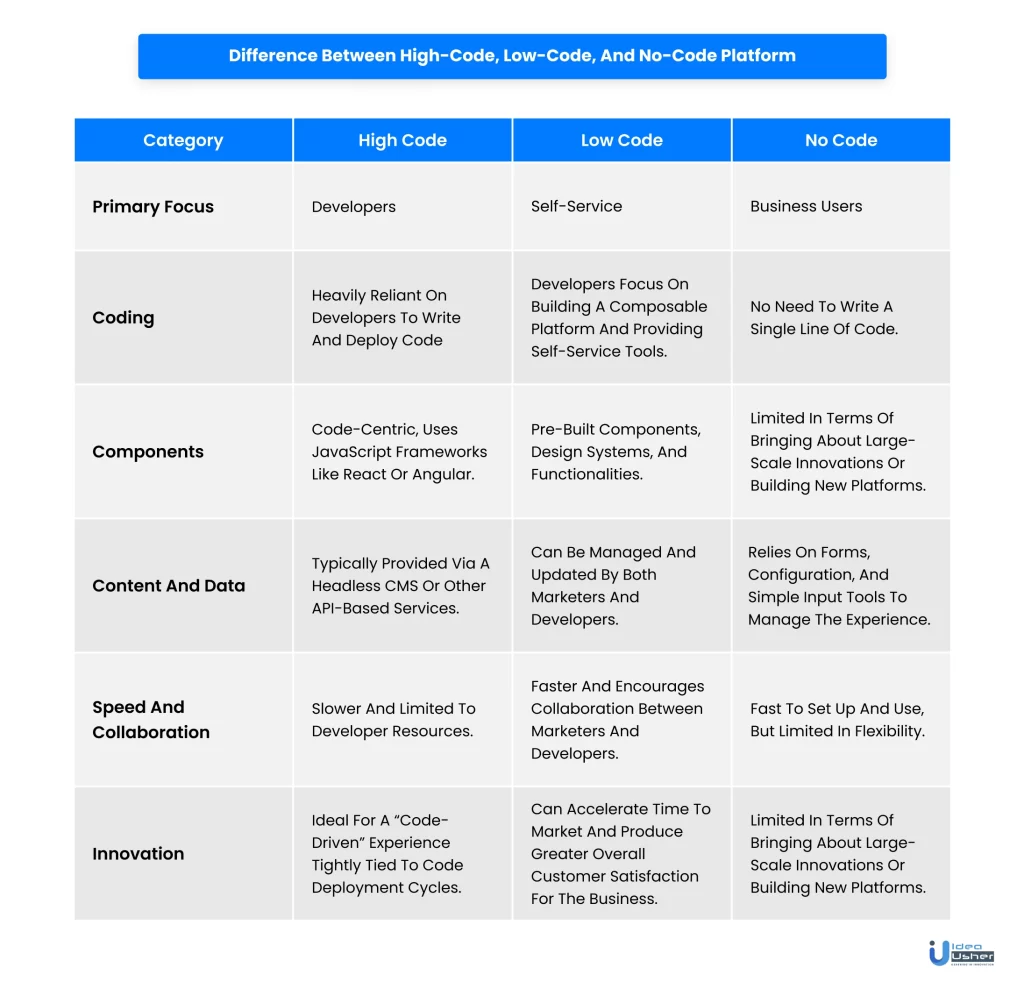
Best Practices For Custom Application Development
Custom software development is necessary when organizations require specific software needs that off-the-shelf software cannot address. This ensures a unique, future-ready platform blended with automation for particular users, but risks such as missed deadlines, exceeded budgets, and weak code ownership must be circumvented, which is why there is a thorough guide stating the best practices for custom app development so you can make the right choices.
1. Document Development Stages
- Thoroughly analyzing the scope and planning the requirements ensures that all aspects of the project are accounted for.
- Precisely documenting each step of the development process is crucial to its success.
- This includes creating a test design and checklist to ensure the software is fully vetted, outlining the scope of the project to work only on pre-defined deliverables, defining a detailed implementation plan that includes timelines and users, and providing user documentation with FAQs.
- Precise documentation provides assurance and helps optimize the software’s utilization, estimate the required resources, and more.
2. Stay Close To Your Budget
- To ensure successful development, it’s crucial to determine the budget and pricing model for custom software.
- When choosing a mobile/web application development company, find one that suits your needs and budget.
- There are several factors to consider when estimating development costs, such as the number of working hours required based on complexity, functionality, design, and platform.
- The hourly rate may vary depending on the location and expertise of the developers. Third-party API costs, cloud services, and web hosting charges may also affect costs.67
- Additionally, it’s essential to include a buffer of 20%-30% of the total cost to account for unforeseen circumstances.
Here are two pricing models to help you with your budget plan:
| Time & Material Model | Fixed Price |
| Costing is based on time spent working plus technology costs | Agree on a predetermined cost that you will pay to your development partner. |
| The flexible payment option here is suitable for projects without a predefined scope. | Requires determining the project timeline upfront to calculate the cost |
| Allows for more involvement in the project and greater control over expenses. | Suitable for projects that follow the Waterfall methodology |
| Costs can change during the development process. | Cost remains fixed throughout the project. |
3. Hire The Skilled Team For the Development Process
Forming a proficient team of experts is crucial for achieving your project’s objectives and creating a successful product. One of the most dependable methods of building high-quality custom software is by outsourcing your project to a custom software development company. This approach allows you to access a team of technical specialists with extensive experience designing and implementing custom software, enabling you to obtain an efficient and dependable application.
You must check a few things before finalizing the custom app development company:
- Company website
- Working history
- Location
- Size of the company
- Domain expertise, references, and review
- Security, IP policy, and
- Experienced workforce
4. Choose The Trending And Suitable Tech Stack
- Your primary objective is to understand the necessity of custom software and its potential benefits, such as improving productivity, automating processes, or enhancing customer experience. Once you identify your needs, you can seek experts and choose the appropriate technology to support your business.
- Selecting the right technologies for development is crucial, including programming languages, frameworks, libraries, and other tools.
- It’s important to define them early on to hire the right team of experts. However, it would help if you did not rely solely on your potential development partners’ tech stacks.
Consider the following four parameters when choosing the most suitable stack for web development:
- Product – Define the purpose, target users, and expected impact of your product
- Platforms – Decide whether to develop a web application, mobile app, desktop app, or all of them
- Development – Choose stable technologies and complementary tools to speed up development
- Talent pool – Choose widely used technologies to make it easier to hire skilled developers at a lower cost.
As software development involves two primary components, namely front-end and back-end development, it is crucial to select suitable technology stacks for each of them:
- Front-end: HTML, JavaScript, CSS, Bootstrap, frameworks, Swift, Java, Kotlin, etc.
- Back-end: LAMP stack (Linux, Apache, MySQL, & PHP /python/ruby); MEAN stack (MongoDB, Express.js, AngularJS, & Node.js); Microsoft stack (.NET, C#, SQL Server, Azure, Visual Basic, win.js, ReactXP)
5. Establish Objectives And Milestones
- The first step towards successful custom app development is understanding your requirements.
- Your development team will inquire about the kind of software you need, how it can benefit your business, and its intended impact.
- Creating a realistic plan and milestones is crucial to delivering the desired product. These milestones are various stages of development that need completion within a set timeline and budget.
- Here are some of the following steps that should be taken:
- Formulate an effective plan.
- Plan the desired workflows.
- Establish a complete roadmap for implementation, taking into account factors like time and budget.
- Define project success criteria acceptable to end-users, customers, and stakeholders.
- Undertake the development work.
- Review the work at each scheduled milestone.
- Gather feedback from stakeholders or immediate users at each stage.
- Identify areas that need improvement.
These elements are essential to project management, and each development process must be evaluated against qualitative criteria and given a concrete milestone because the needs for custom software might differ greatly from one another.
6. Select The Suitable Methodology / SDLC
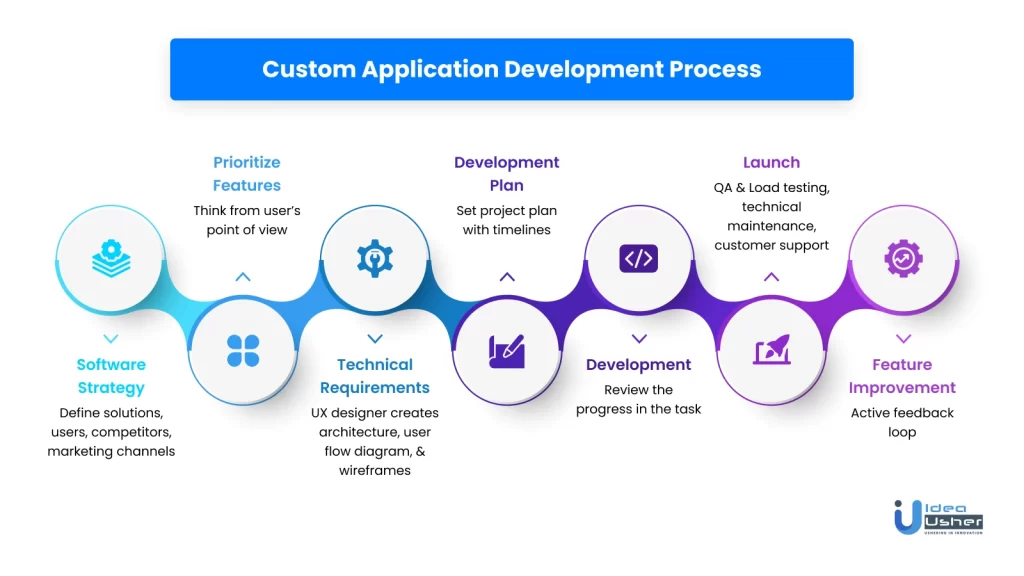
The Software Development Life Cycle (SDLC) is a standard methodology that development companies typically adopt during the software development process. It involves a series of well-defined tasks that must be executed at each stage of development. Two of the most commonly used types of SDLC methodologies are:
6.1. Agile:
The agile development cycle is iterative rather than linear, and each iteration results in the release of a functional product. This method also allows for the microscopic tracking of the work being done.
| Advantages | Disadvantages |
| Clear product objectives with stakeholder involvement | Requires significant knowledge and self-control |
| Effective teamwork and cooperation | Planning can be inadequate |
| Continuous feedback from clients | Clear timelines are needed for monitoring |
| Flexible and adaptive to modifications | Requires skilled and dedicated resources |
| Quick and results-oriented | The final product may differ completely from the expected one |
6.2. Waterfall Model:
You must choose this model if you are confident that your requirements accurately reflect the needs and desires of your end users and that your hypotheses are accurate.
| Advantages | Disadvantages |
| Comprehensive | Time-consuming documentation |
| Simple to manage, implement and follow | Limited support and maintenance capabilities |
| Easy to follow | Delivery only at project completion |
| Quick delivery | Difficulty modifying requirements mid-project |
| Predictable and fixed cost | Limited flexibility |
| Structured process | Limited room for process changes or simultaneous workflows |
7. Detailed QA And Testing
- The goal of any custom software development project is to have a highly functional, error-free product at launch.
- To achieve this, regular quality assurance and testing are critical.
- Ensuring the software’s versatility in all environments is essential once it’s developed and ready for business use.
- Testing should be integrated into the development process from the start to:
- Identify and track bugs as they arise.
- Prevent errors and failures.
- Allow enough time to correct any issues.
- Before launching the product, thoroughly testing the application’s various parameters ensures it performs seamlessly across different devices and browsers.
- To guarantee data security, each element and logic should be tested, and security certificates and encryption reviewed.
- Software testing occurs at two levels:
- Technical testing – QA professionals test the software under different scenarios and across multiple devices to verify the functionality of the foundational elements.
- User testing – Beta users check whether the software functions as intended and report any issues they encounter.
Pros And Cons Of The Custom App Development
Custom app development can be highly beneficial for businesses for various reasons; it offers advantages such as scalability, easy deployment, and increased productivity. It is important to fully evaluate the pros and cons before making a final decision. Here are the pros and cons listed for your reference:
| Pros | Description |
| Data Security | Customized apps can be integrated with advanced security measures and data encryption for increased safety of users’ personal data. |
| Customer Relations | These apps allow for a more personalized approach toward clients with the integration of analytic tools to track their preferences and needs. |
| Competitive Advantage | Custom apps can be designed to emphasize the unique selling points of a business, setting it apart from competitors. |
| Investing in Yourself | It offers more control to businesses and can evolve alongside the growth of the company. |
| Promotion Possibilities | Custom apps have greater promotion possibilities through the App Store, potentially reaching millions of users worldwide. |
| Scalability | These apps are flexible and can be designed to cater to the changing needs of the business. |
| Increased Productivity | Customized apps can be tailored to streamline and optimize specific business processes, ultimately increasing productivity. |
| Cons | Description |
| Time | Developing a customized app can be time-consuming, involving a software development process that may take weeks, months, or even years. |
| Cost | Developing a customized app can be expensive, requiring a significant amount of resources to develop. |
| Strategy Changes | Changes in overall strategy during the development process can lead to added costs as more software development time and effort are required. |
| Bugs | Customized apps may still have bugs despite the development process, potentially causing business-critical errors. |
| Limited Functionality | Ready-made solutions are designed for specific functionality, while customized apps can expand and improve their capabilities through the addition of new functions. |
Trending Technologies For Developing Custom Applications
1. Open-source Software Development:
Open-source software development allows the development community to access the source code of the software. It offers a great advantage by increasing productivity by reusing software components. It also helps in improving the interoperability of the software by avoiding proprietary architecture.
2. Artificial Intelligence (AI):
Incorporating AI into custom application development can significantly improve the development process. NLP (natural language processing) can help analyze specific requirements and recommend improvements based on best practices. AI technologies such as modeling and machine learning can also be integrated into custom software development through APIs and cloud services.
3. Blockchain Technology:
Custom software development can leverage open-source hyper-ledger technology and blockchain ledgers to build secure transactional and financial applications.
4. Progressive Web Apps:
Progressive Web Apps (PWAs) are emerging as a new category of web apps that proffer an indigenous app-like experience within the web browser. These PWAs are swift, dependable, and compatible with any device that has a web browser. As we look forward to the future, we can anticipate a significant upsurge in the number of PWAs, as they serve as a feasible substitute to native apps that are more user-friendly and simpler to create.
5. Cloud-based Development:
Cloud-based development offers the advantages of cloud computing, supporting coding, integration, design, and other development functions to build cloud-native and on-premise applications. It also promises speed, cost control, and on-demand convenience.
Cloud technology has emerged as a crucial aspect of custom software development, owing to its ability to enhance agility and performance. Cloud systems provide developers with limitless testing and staging servers. In addition, companies can utilize pay-as-you-go software features offered by cloud computing, leading to greater cost-effectiveness.
6. Analytics Technologies:
Incorporating analytics into custom software development is now easier with cloud-based services, AI, and automation. These technologies allow software applications to represent data through visualizations, dashboards, and predictive capabilities and help in enhancing communication between different departments, spot market trends, and automate processes.
Moreover, embedding analytics within a company’s custom software solution enables a better understanding of its customers, facilitating the making of informed decisions based on insights obtained from the software.
7. 5G:
The next generation of mobile networks, known as 5G, is set to revolutionize the speed and reliability of connections. As a result, we can expect an increase in mobile applications that take advantage of 5G’s capabilities, resulting in improved performance and enhanced user experience.
8. Wearable Technology:
Enterprises are also emphasizing wearable technology, with apps that can communicate with these devices in unique ways. By providing innovative information delivery, this trend will impact various industries, including sports, fitness, fashion, hobbies, and healthcare. Integrating wearable gadgets with smartphones will also pave the way for new and improved mobile app development strategies, ultimately enhancing the user experience.
Why Custom App Development Is The Next Step For Your Business?
The horizon of custom applications development is brimming with possibilities and promises. Advancements in artificial intelligence and machine learning, cross-platform development, progressive web applications, blockchain technology, the Internet of Things, the advent of 5G, etc., have armed developers with the necessary resources to craft revolutionary and groundbreaking custom web/mobile applications that can revolutionize our lifestyles and work patterns.
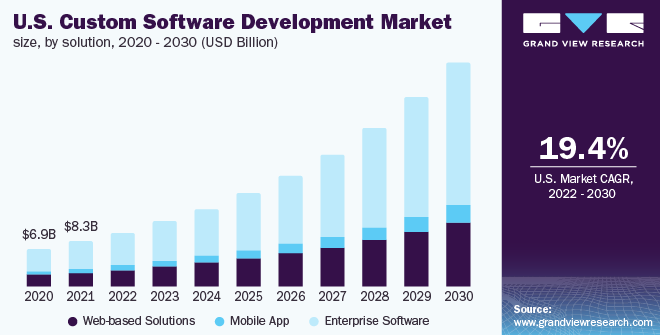
In 2021, the worldwide market for custom software development was estimated at US$24.46 billion. Experts predict that this market will grow at a compound annual growth rate (CAGR) of 22.3% from 2022 until 2030, which indicates a significant expansion of this sector in the upcoming years.
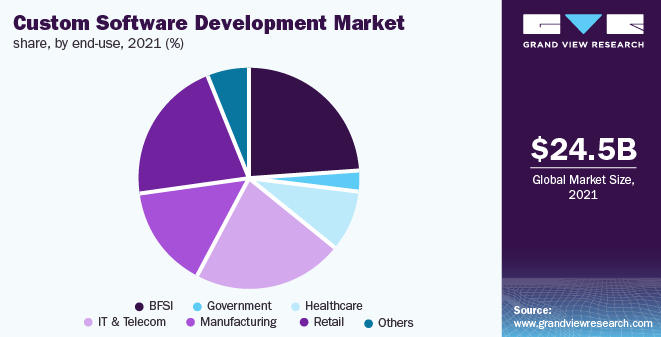
In 2021, the BFSI sector dominated the market with a share of over 20.0%. Custom banking and finance software applications play a crucial role in delivering an immersive user experience in the BFSI industry.
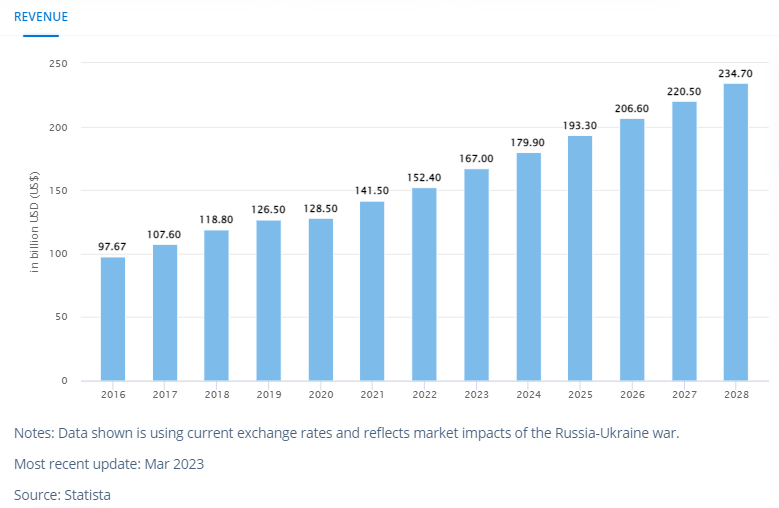
The application development software market is expected to experience significant growth in the coming years, with projected revenue reaching US$167.00 billion by 2023. The market is anticipated to grow at an annual rate of 7.04% from 2023-2028, resulting in a market volume of US$234.70 billion by 2028. The United States is expected to generate the highest revenue, with a forecast of US$85,660.00 million in 2023, surpassing other countries globally.
Build Your Custom Application With Idea Usher
To stay competitive, companies must leverage emerging technologies to add real value to their customers. Custom application development ensures that security requirements are tailored to the specific needs of the organization and provides adequate protection for customer data. In fact, it facilitates complex tasks like billing, card insertion, and biometric scanning with ease, making them more user-friendly. Real-time payment and transaction processing, along with immediate bug fixes, are made conveniently possible with custom software – that provides more reasons why businesses must consider building or investing in custom solutions.
If you are interested in building a custom app for your business, reach out to us for consultations. We strive to provide optimum results and ensure a quick return on your investment.
Contact us to take your business a notch higher with our backend development services.
E-mail: [email protected]
Phone Numbers : (+91) 946 340 7140, (+91) 859 140 7140, and (+1) 732 962 4560
FAQ
Q. What is custom app development?
A. Custom app development is the process of creating software applications tailored to meet the specific needs and requirements of a business or organization. These apps are designed to offer unique functionality and features that are not available in off-the-shelf software, providing businesses with a competitive advantage.
Q. Why do businesses need custom application development services?
A. In today’s rapidly evolving market, custom applications are crucial for businesses to thrive and expand. Such solutions ensure the confidentiality and security of your data since it is accessed only by a limited number of users. Conversely, off-the-shelf software carries a high degree of data security risk. Custom software development, therefore, offers the optimal choice for businesses that value security, privacy, and accountability.
Q. What is the future of custom applications?
A. The future of custom apps is promising, with advancements in emerging technologies such as AI, cloud computing, IoT, blockchain, etc. Custom apps will enhance efficiency, automate tasks, and provide tailored solutions to businesses. They will enable companies to stay competitive, deliver an exceptional user experience, and meet changing customer demands, resulting in higher productivity and profitability.
Q. How much does it cost to build a custom mobile app?
A. The cost of developing a custom app is a complex issue that depends on several factors, including the app’s type, features, functionality, design, and planning. Additionally, the team’s experience in app development is crucial for efficient and effective development.
Other factors, such as the platform (iOS, Android, or both) and the inclusion of features like geolocation, push notifications, or in-app purchases, can also impact the overall cost. It’s worth noting that app development costs extend beyond the initial phase and encompass ongoing expenses associated with maintaining and updating the app, as well as hosting and deploying it to various app stores.









Rebecca Lal